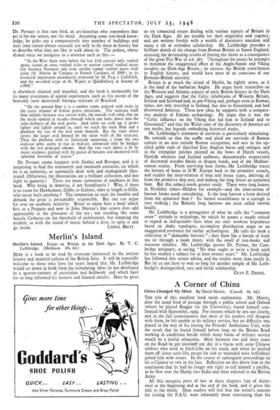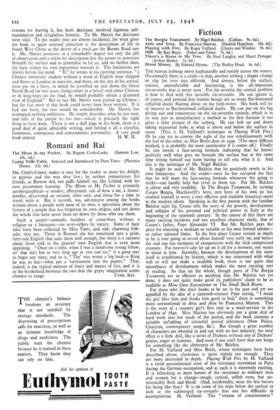A Corner of China
China Changed My Mind. By David Morris. (Cassell. 8s. 6d.)
THE title of this excellent book needs explanation. Mr. Morris, after the usual kind of passage through a public school and Oxford (where he played Rugger for the University), found himself con- fronted with September, 1939. For reasons which he sets out clearly, and in the full consciousness that most of his readers will disagree with them, he felt unable to do military service, but no difficulty was placed in the way of his joining the Friends' Ambulance Unit, with the result that he found himself before long on the Burma Road working in conditions beSide which many forms of military service would be a restful relaxation: 'After between two and three years on the Road he got involved one day in a fracas with some Chinese soldiers who tried to hitch-hike on his truck, and when hepushed them off (since such lifts except for sick or wounded were forbidden) pelted him with stones. In the course of subsequent proceedings he hit a Chinese or two in the face. Reflection on this drove him to the conclusion that he had no longer any right to call himself a pacifist, so he flew over the Hump into India and there enlisted in the British Army.
All this occupies parts of- two or three chapters (out of thirty- two) at the beginning and at the end of the book, and it gives the 'title to the whole. Most readers will feel that the writer's reasons for joining the FA.U. were inherently more convincing than his
reasons for leaving it, but both decisions involved rigorous self- examination and scrupulous honesty. To Mr. Morris the decisions were vital. To the reader they are almost incidental, for what gives the book its quite unusual attraction is the description of life in South West China as the driver of a truck apn the Burma Road saw it. Mr. Morris possesses in a remarkable degree not only the gift of observation and.a talent for description but the power to penetrate beneath the surface and to generalise so far as, and no farther than, the facts within his own experience warrant it. The limitations are always before his mind. " If," he writes in his opening sentence, " a Chinese university student without a word of English were shipped and flown to London in wartime, and there, on the day of his arrival, were put on a lorry, in which he travelled up and down the Great North Road for two years, living either in a hostel with other Chinese or in long-hops on the road, he would probably obtain a distorted view of England." But in fact Mr. Morris soon picked up Chinese ; but for that most of this book could never have been written. If it had not been, the loss would be considerable. Mr. Morris has attempted nothing ambitious. He simply describes what he has seen, and tells of the people he has met—which is precisely the right thing to have done. There is not a dull page in the book, there is a good deal of quite admirable writing, and behind it all a cheerful, humorous, courageous and conscientious personality. A very good



































 Previous page
Previous page